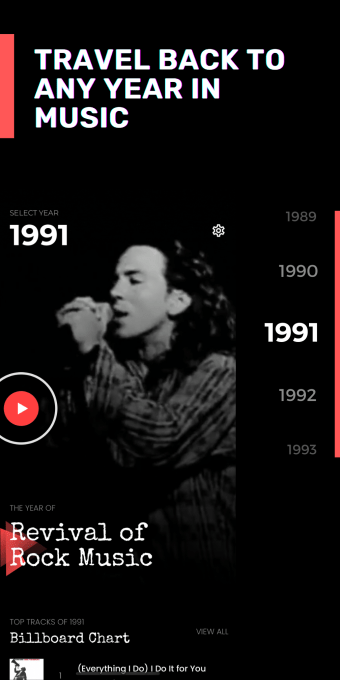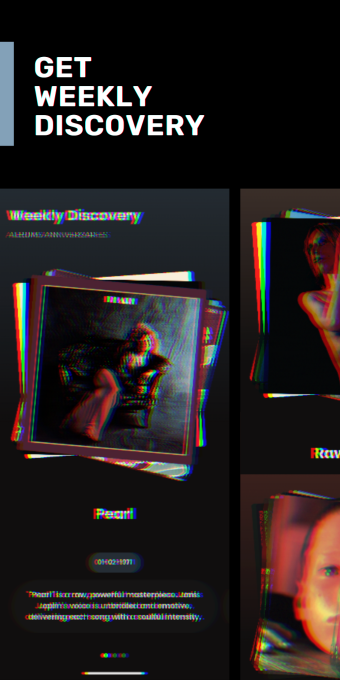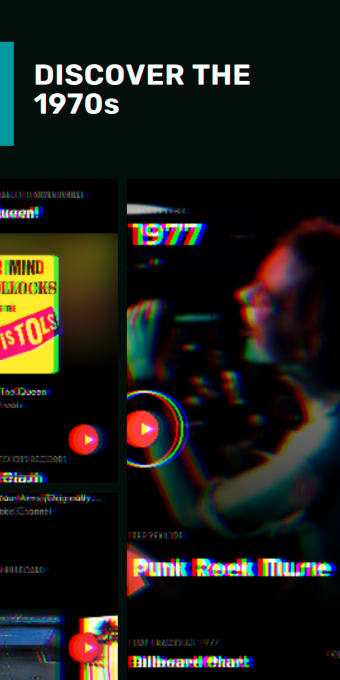A new app called Rewind wants to make it easier for music fans to explore the top songs of decades past. Hoping to cater to consumer demand for nostalgic music experiences, Rewind allows users to “time travel” through the music charts from 1960 through 2010 to learn about how older songs have influenced today’s hits.
The app was built by developer Ziad Al Halabi, whose day job involves mobile app development at music streaming service TIDAL. The developer says he enjoys working on music apps, having earlier launched an audio player for musicians, Backtrackit, which gained some 2 million installs.
With Rewind, which originally began as a weekend project, the goal is to offer a portal to explore the older tunes that once ruled the top charts.
“[What] would it be like if you opened your favorite music app in 1991? Or 1965?” the app’s description asks. “What are the biggest hits at the time? Who are the top artists or the rising new ones?”

Image Credits: Rewind
For older music fans, those questions may be easier to answer. But Gen Z brings a new group of users who are exploring music through apps like TikTok, where a song’s release date doesn’t necessarily matter. Already, TikTok has proved successful in introducing younger people to popular tracks from past generations, like Kate Bush’s “Running Up That Hill” or Fleetwood Mac’s “Dreams” — both of which went viral on the video app, breaking into the top charts years after their original run. And they are not alone.
This interest in older music dovetails with other Gen Z “nostalgia” trends, like their embrace of flip phones, Y2K fashion, wired headphones, disposable cameras, 90s music (a preference spanning generations, in fact), and of course, vinyl.
“I’ve always been interested in how music has changed over time,” said Ziad. “Rewind is a capsule of all the music, artists and major events in one place. The app offers a new way of discovering new old music which is based on historical eras with a little hint of nostalgia,” he continues. “It’s exciting to see momentum with thousands of listeners, Rewind is perfect for tastemakers and fans looking to discover new music from the good old days,” Ziad added.

Image Credits: Rewind
The app isn’t just a way to browse the charts from years past, however. It takes things a step further and even includes some modern twists.
For starters, users can explore the music from a given year by top albums and top music videos, in addition to growing the top Billboard charts. It also delves into relevant trends from a given time period. For instance, browsing the year 1991 offers a selection of “grunge-defining records,” like Nirvana’s “Nevermind” and Pearl Jam’s “Ten,” among others. Other sections present tracks that saw major radio airtime that year, highly anticipated releases and newly formed bands that emerged that year, and so on.
In addition, Rewind features a “news” section that includes major events and moments from the year in question. It also includes ads that give it a retro feel. For example, in 1965, listeners will see ads for the first distortion guitar pedal while users browsing the 1980s might see ads for new synth instruments that helped shape 80s sounds.
For a bit of fun, the app leveraged ChatGPT to write short reviews for music albums in its “Weekly Discovery” feature and used the AI technology to put together mixtapes for different years by asking ChatGPT questions like “can you make me a mixtape of 90’s best guitar riffs?”
Another feature offers a way to scroll through a TikTok-style music feed that accompanies each year. Here, you can listen to song clips from the time period in a vertical feed. This particular feature could be better developed to include “like” or “comment” buttons, but for now you can play or pause the track or open the song directly in TIDAL.

Image Credits: Rewind
Not surprisingly, given Ziad’s job, Rewind integrates more deeply with TIDAL, allowing subscribers to stream tracks in full, explains the developer. This is because his work at TIDAL allowed him to easily access the API and the TIDAL catalog. But if Rewind catches on, he would like to add support for other music apps. However, even without a TIDAL subscription, users can stream the 30-second previews and scroll through the app’s TikTok-like feed.
“The feedback I’m getting from users is that despite not having a TIDAL subscription, it is still a fun experience to browse the different years, get weekly discovery of albums [and] scroll through the TikTok-style feed,” Ziad tells us.
Launched last month, the app gained a few thousand downloads on its debut weekend and is slowly growing. It’s available as a free download on both Android and iOS and doesn’t currently generate revenue.
Rewind’s new app lets you ‘time travel’ through music from decades past by Sarah Perez originally published on TechCrunch







